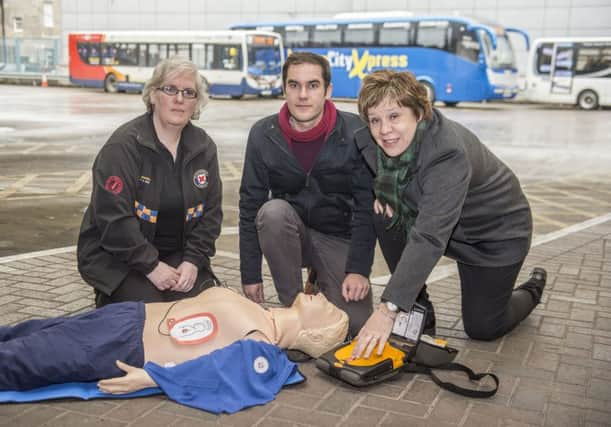Half of Scots have no first aid training


Research by St Andrew’s First Aid found 75 per cent of adults have not received professional training on how to handle a loved one or colleague suffering an attack.
The survey also revealed that 50 per cent of Scots have received no first aid training whatsoever.
Advertisement
Hide AdAdvertisement
Hide AdThe figures were released by Scotland’s largest first aid charity to mark Scottish First Aid Week, which runs until November 29 and encourages members of the public to learn life-saving skills.
In 2013 there were 7,239 deaths in Scotland where coronary heart disease was the underlying cause.
The Heart Research Institute found the number of heart attacks north of the border each year has decreased by around 25 per cent between 2000 and 2009 in both men and women, but is still 20 per cent and 35 per cent higher than England’s incidence level.
Only nine per cent of Scots have been trained in the use of an AED (defibrillator), the life-saving device which sends an electrical shock to the heart to restore regular heart rhythms, which can be vital in helping those suffering cardiac arrest.
Only around one in 20 Scots currently survive cardiac arrest.
“Despite the startling fact that half of the Scottish population have never had any training in any basic First Aid skills, it is more alarming to think that most people would not know what to do in the event of someone having a heart attack,” Stuart Callison, St Andrew’s First Aid chief executive said.
“Scotland needs to do much better and as much as credit is due to the Scottish public who do have some basic first aid training, the survey has highlighted the worryingly vast gap in the nation’s abilities in administering life-saving first aid skills. Our aim is to create a nation of life-savers.”
The Scottish Government unveiled a new strategy in March aimed at saving 1,000 lives from out-of-hospital cardiac arrest (OHCA) over the next five years.
Advertisement
Hide AdAdvertisement
Hide AdIt aims to equip a further 500,000 people with CPR skills by 2020 and improve mapping of defibrillators so that emergency call handlers can quickly direct members of the public to them.
Maureen Watt, minister for public health, said: “The best way to ensure that more people survive out-of-hospital cardiac arrest is to increase the number of people who have CPR skills, and crucially, to make sure they are confident enough to attempt resuscitation if the need arises.”
Simon Gillespie, British Heart Foundation chief executive, said: “Scotland has already embraced the concept of creating a nation of lifesavers, and we’re now supporting around three quarters of secondary schools in teaching their pupils vital CPR skills.”